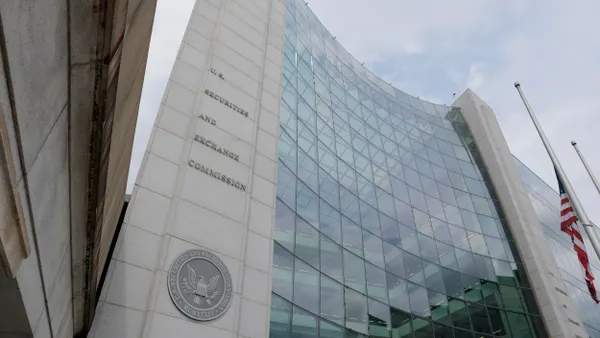CFO crisis leadership encompasses three facets, according to Jeff Laborde, CFO of JAGGAER, a cloud-based spend management software provider. The first — respond as effectively as you can to short-term needs while preserving cash and liquidity. Second, build engagement between finance and procurement teams. And third, ensure efficiency and be more responsive to quickly changing demands and shifting priorities.
Laborde has spent most of his career leading finance teams, and the Raleigh, North Carolina-based company is the sixth for which he's served as CFO. Each of his turns in the role have sharpened his view on what the CFO job calls for, particularly in unsteady and challenging times.
In an interview with CFO Dive, Laborde said a down economy doesn't necessarily imply a business decline as it does in sectors like hospitality. But, he said, managing costs remains critically important for companies, particularly those in the SaaS business. The magnitude of the COVID-19 disruption is in a class of its own.
Four months in, CFOs are aware of the challenges, have seen some of the outcome, and now must turn their attention towards maintaining productivity over the long haul. In doing so, Laborde recommends taking a "war room" approach.
This means bringing stakeholders together. "When it's a big enough crisis, you treat it differently," he told CFO Dive. "Extract yourself from other distractions, take stock of where you're at, assess the risks, and then go about making change. The making change part is critical. Holding their breath to see what happens next with COVID is very dangerous at this point."
Learn from past lessons
Enterprise software company Aptos, the company at which Laborde was CFO just prior to JAGGAER, is a retail-focused SaaS provider. Its retail customer base was among the first to be adversely impacted by the pandemic quarantine. "As a team, we applied a war room mentality, and made some very quick decisions, sometimes quicker than our customers," he said.
Aptos felt significant pressure from its customers, as retailers closed their stores following lost revenue. Since leaving Aptos after it was acquired by a Goldman Sachs affiliate earlier this year, Laborde remembered a particular lesson — to preserve alternative plans for as long as possible, and to always assume a crisis can get worse before it gets better.
But even as a crisis escalates, it can provide the necessary insights into what in the company isn't working. In this regard, crises can be hugely helpful if used correctly. "Never let a good crisis go to waste," he said.
Keep it simple
But in the present, how can CFOs preserve their remaining cash and liquidity in a sustainable way?
Relatively unique to this moment, Laborde said, is the set of policies and programs the government has put in place to try to assist companies, including the Payroll Protection Program (PPP) and the Main Street Lending Program.
“None of them is perfect and many come with restrictions,” Laborde said. “But there are a lot of tools out there for CFOs to use.”
More practically, he said, there’s the overly simplistic cash-in, cash-out equation. At JAGGAER, Laborde focuses on the equation closely.
"Breaking the components of cash-in, cash-out down to a very granular level is how we’ve done it," he said. "Over the last four months, I've taken daily and weekly cash flow management, including daily standup calls, with our global collections people, which we’ve found to be critical."
The takeaway
Laborde's bottom line — dynamic times call for dynamic tools and management style.
"I just think of the very literal fact that very few people are going into their offices these days, and many are talking about all the free time they now have," he said. "But I haven’t been this busy in a long time. I’m working longer hours.
"Because of these unique circumstances, I know I have to react to them, not sit still, and recognize that I have to potentially reinvent the ways I manage our business and how we go to market," he said.
Clarification: Added greater detail to Laborde's work with Aptos.













